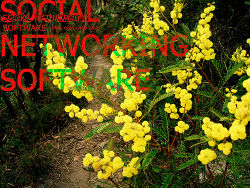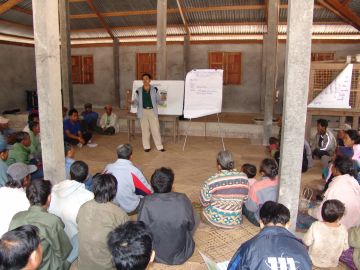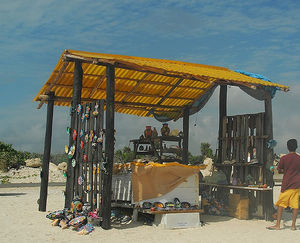Facilitating Online/Course Schedule2010
This is the schedule for the course. On the whole, we will work on a weekly basis, however there will be some activities that span over a couple of weeks. We will be having a break from 27th September to 10th October which aligns with Otago Polytechnic semester dates and school holidays in New Zealand.
Contents
July 19th Introduction

We will spend this week orientating ourselves to the course, becoming familiar with the online technology and introducing ourselves to the rest of the course participants. For those of you who are new to this way of learning, the first few weeks may seem quite daunting. However, stick with it, network with others for support and help, and the rest of the course will flow on nicely.
Setting up your blog
During the course you will be expected to keep a reflective blog for your personal learning and to meet the requirements of Assignment One. There are a number of free blogging platforms available - this course recommends Blogger because it is very easy to use if you have never blogged before. However, there are other choices such as Wordpress, Typepad or Edublogs.
- Here is some detailed information about how to set up a blog.
- Here is information about how to leave a comment on a blog.
- More details about how to subscribe to a blog.
- Here is more information about how to write a blog post.
Joining Wikieducator
As part of the orientation to the course, we would like you to add your contact details including your blog address to the Course Wiki 'Participants' page.
- Here are some instructions on how to do this.
Course meetings
We will have regular 'live' meetings (otherwise referred to as web conferencing or webinars) that will help us get to know each other better, build a learning network and/or community, and become more familiar with web conferencing tools. The days and times will vary from week to week to give everyone the opportunity to attend as many meetings as they can. We will also try to accommodate as many of our international colleagues as possible with regard to dates and times. We will record all meetings so if you miss one, you will be able to catch up with content.
- You will be strongly encouraged to take it in turns to facilitate the live meetings. This will give you the opportunity to practice online facilitation and become familiar with the communication tools before the mini conference.
- Our first few meetings will using Elluminate, which is a propitiatory web conferencing tool. This virtual classroom is open now so that you can go in, set up your computer and meet others to practice online communication. To access the Elluminate virtual classroom, please click on this link.
- For further information about how to set up Elluminate and what to do when you get into the virtual classroom, please click here.
Join the first course meeting in the Elluminate virtual meeting room on Thursday July 22nd 20.00 hours New Zealand ((World Clock), or Friday 23rd 08.00 hours NZ (World Clock)
|
|
Please try to complete the following tasks before the first course meeting.
|
July 26th Setting the scene
This week we would like you to think about what you want to achieve during this course - what is it you want to learn to facilitate? Are you a teacher wanting to know how to facilitate online teaching and learning? Or, do you work for a non-profit organisation wanting to know how to facilitate online communities and networks, or run information campaigns? It may be that you work for a business and would like to know how to facilitate online meetings or collaborative projects. This plan will act as a guide for your learning, and will also help us to tailor the content of this course to meet your needs.
Here are some ideas about online facilitation that you may wish to explore during this course:
- Meetings
- Events eg seminars, workshops or conferences
- One to one meetings eg academic supervision or business coaching/mentoring
- Long term (or short term) projects eg collaborative work
- Teaching an online class
- Presenting information to sell a service or business
- Develop an online community or network
- Run an online campaign
|
Join the virtual class meeting in Elluminate to share your ideas and plans with other participants
Wednesday 28th July 2010
Thursday July 29th 2010 |
|
1. Watch the video by Clive Shepherd called "Welcome to the virtual classroom". This video explains the difference between asynchronous and synchronous communication, and explains why and how you'd use online communication.
|
August 2nd The 'who', 'what' and 'why' of online facilitation

It is important that we understand why we are using the online environment for communication, and how online communities and networks work before we launch into our adventures with online communication tools.
Why? The world is changing and the Internet allows people to communicate, collaborate, network and learn in a new and different way. As teachers, we have to understand that students are learning by connecting to their online network. The freedom that the Internet provides is allowing them to manage their own learning and take control of what, how and when they learn. Those of us who work for non-profit organisations need to realise the potential of the Internet to develop online communities and networks that can support each other, advocate and campaign for change. As for business people, we must understand how to connect online with our customers as well as effectively utilise online communication tools in these days of increased costs and budget squeeze.
What? Any number of things can be facilitated online from an email discussion list or bulletin board on Trade Me, to a real-time business meeting or Twitter campaign protesting a social issue.
Who? The 'who' can vary from a formal class enrolled at an educational institution, to a network of people loosely connected because of a common interest or goal. Or the 'who' may be a formal community of practice made up of people who have come together with a definite purpose in mind, such as a professional organisation or group with a special interest.
|
Join the virtual class meeting in Elluminate on Friday 6th August 11am - 12pm New Zealand (World Clock). This session will be facilitated by course participants: Chris Woodhouse and Jillian Clarke.
Elluminate recording - you do need to be able to access Elluminate to be able to view this. |
|
1. Watch the video "Did you know 4.0" which will help you start to think about the 'grand scheme of things' and where you sit as an online facilitator.
|
August 9th What is online facilitation?

Over the last two weeks we have thought about what and why we want to facilitate, but we haven't really talked about what online facilitation actually is. The definition of facilitation in the Oxford Dictionary is to 'make easy or easier'. As online facilitators, we need to think about how we make communication, learning, task management and use of technology 'easier' for the people we are working with. There are a number of models around that support us as we develop online facilitation skills. Nancy White begin_of_the_skype_highlighting end_of_the_skype_highlighting has suggested we think about ourselves as a 'community technology stewards'. Gilly Salmon has developed a 5 stage model of online moderation and Ed Hootstein refers to wearing four pairs of shoes. To be effective online facilitators, we also need to understand how online communication works. In order to do this, it helps to understand the 'rules' of online communication otherwise known as 'netiquette'.
Those of us who are teachers are further challenged to think about our practice, be it in the online or face-to-face environment - what is the difference between facilitating learning and the more traditional views of teaching? In other words, how do we facilitate learning compared to the traditional model of delivering content as the 'expert' to the learner who knows nothing? And how do we do this in the online environment?
|
Join either one or both virtual class meetings in Elluminate. Monday's session be facilitated by Peter Brook and Carole McCulloch. Sharon Schindler and Carole McCulloch will be facilitating Saturday's session.
Monday 9th August
Saturday 14th August - Nancy White |
|
1. Read "CoP Series No 10: Stewarding Technology for Community" by Nancy White, 2009.
|
August 16th Case studies
Here are several case studies that illustrate aspects of online facilitation in a number of contexts.
- eMentoring. Jenny Leigh talks to Sarah Stewart about how she uses web conferencing for eMentoring in business and non-profit organisations.
- Virtual conference. The Virtual International Day of the Midwife is an annual online conference for midwives and people interested in pregnancy and birth.
- Facilitating asynchronous discussion. Lorraine Mockford talks to Sarah Stewart about strategies for engaging students in discussion boards and people in general interest online communities.
|
Join this week's course meeting in the Elluminate virtual meeting room here on Friday 20th August 12.00 hours New Zealand (World Clock). This session will be facilitated by Jane Field and Rayna Dickson. Bronwyn Hegarty Email will be supporting the class and session.
|
|
Summarise your learning from the last three weeks in your blog. You may wish to consider some or all of these questions.
|
August 23rd The idea
We have identified what online facilitation is and looked at several models for how we can do it. We have also looked at a couple of examples of how online facilitation works in education, business and non-profit organisations. Over the next few weeks we will be focus more closely on the intricacies of online facilitation and 'play' with some communication tools.
Once you know what you want to facilitate there are several issues you need to think about.
- What is the most appropriate approach to the event, project or discussion? Synchronous or asynchronous?
- What are the barriers to your facilitation and what are the enablers? For example, do the participants have access to the Internet bandwidth that will support your event, project or learning activity?
- What communication tools will be most appropriate? How will you ensure your participants will have access to the tools?
- What technical skills will you need as facilitator and what skills will your participants require? How will you ensure the participants have the appropriate skills?
- Is this a work or 'play' activity? Will time constraints impact on the participants' ability or motivation to attend and engage?
- If this is a work activity, will the participants' organisation, institution or employer allow them to have access to the Internet, or will institutional policies or firewalls prevent them from engaging with you?
- What are the costs to you, the participants and their employer/institution/organisation? Will the costs be prohibitive?
Another issue you need to think about is sustainability of your online facilitation. In one respect working online is more sustainable than spending large amounts of money to fly people around to attend face-to-face meetings. Developing resources and making them available online often reduces the wasteful use of paper. At the same time, there are more general questions about social sustainability to consider.
- Who's going to be involved and who is not? Who does your event or learning activity discriminate against? In other words, who cannot attend because they do not have access to a computer or the Internet?
- How do you ensure that everyone has equal opportunities for learning, communication and collaboration. Is everyone's needs being met?
- Is online the best mode of delivery? Is there another mode of delivery that is more appropriate?
- In terms of planning for the future, how do we manage eWaste?
|
Skype is a free tool that you download onto your computer and use for synchronous voice, text and video meetings. It is especially effective for small group or one-to-one meetings.
|
|
1. Read the article Building Sustainable Communities through Network Building by Valdis Krebs and June Holley (2002).
|
August 30th Bringing a team, community, network or group together
This week we are going to think about how we bring people together so that we have someone to facilitate. Whether we are starting from scratch building a network, community or team, or working with a captive audience (so to speak) such as a group of students, we need to pay attention to how we organize, coordinate, collaborate and liaise as part of our facilitation role. It is also worth thinking about:
- how do we maintain momentum of the community/network/team/student group?
- how sustainable is the community/network/team/student group?
- how sustainable is our role of facilitator?
Social networking platforms are web services that technically facilitate social networking and community development. From Facebook to Linkedin, each social networking platform has slightly different functionality and social phenomenon.
|
Join the virtual class meeting in Elluminate to share your thoughts and experiences of using social media for online facilitation, or discuss any other issues or learning that have cropped up over the last couple of weeks. This session will be held on Thursday 2nd September at 16.00 hours New Zeland (World Clock)
|
|
1. Watch the video of Clay Shirkey (2008) talking about how we organise ourselves in the digital age Here comes everybody.
|
September 6th Working collaboratively, planning and recording decisions
Online collaboration and planning can be facilitated by a range of communication tools including blogs and wiki.
A blog can be purely a personal tool for recording decisions or reflections. But it can be much more than that. A blog can be part of a blogging network which is what we are building in this course. We each have a blog, we each should be monitoring each other's progress, and we should be commenting and cross referencing each other's posts from time to time. Hopefully by now, we ARE doing all this and are starting to see how a blogging network can function, but ours is a small and time dependent network. Real blogging networks develop over longer periods of time and include strong and weak connections between people, and a much more diverse range of topics. The online facilitator can use his or her blogging network for feedback, sharing information, as well as asynchronous discussion.
Wiki are collaborative tools and can be used for planning, implementation and evaluating events and projects. The beauty of the open wiki such as Wikieducator is the community behind the wiki that can be called on for help, opinions and support. Online communities through wikis are harder to identify as they usually focus around the creation of shared content. Wikis usually have a discussion tab with each page, and you can sometimes see community-like communication there. We will use this wiki to coordinate our mini conference so we can each experience collaboration through a wiki. NB: An alternative collaboration tool to blogs and wiki is Google Documents.
|
Attend this week's course meeting on Friday 10th September 11am (World Clock). This week we will be joined by Dr Wayne Mackintosh who is a key member of the Wikieducator community. Wayne will be talking about how you can use a wiki to facilitate collaboration, organise meetings, events, projects, learning activities etc. This session will be facilitated by Maclcolm Lewis and Claire Thompson.
|
|
1. Read Introduction to Blogging - part of the excellent Wordpress Codex.
|
September 13th Marketing, recruiting helpers and participants
Whether you are developing a learning activity to a group of students, attempting to recruit volunteers to a project or advertising an online event to the wider Internet, you need to think about how you market your event. Even if you are a teacher with a 'captive' audience of students, you want to be able to 'sell' your learning activity or event so that students engage with it. And don't forget the 1% rule that was mentioned in the week: "August 9th What is online facilitation?" - whilst you may get the full attention and engagement of one person, there will be other 'lurkers' who do not engage with you.
Other questions you need to consider when you are marketing your event are:
- Is this activity or event in an open or closed environment? Do I need to target my marketing to specific people or use the Internet to spread as far and as wide as I can?
- What networks do I need to develop and what communities do I need to access in order to market my event/activity?
- How can I leverage or make the most of the serendipitous nature of the Internet?
- Will the event/activity/project be free or does it have a cost involved?
- What tools shall I use - free or proprietary tools?
- Will the speakers/participants incur a cost?
- How will I support people to access the technology before the event/activity?
- How can I market my event to and support people who have minimal access to computers and the Internet?
- Is there a place for integrating the cell phone?
- How can I put information online in a format that can be printed cheaply for people who have limited Internet access.
|
Twitter is a great tool for developing synchronous networks, accessing serendipitous events and disseminating information.
3. Attend one of the two class meetings in Twitter. The meetings will be facilitated by Sarah Stewart. One meeting will be on Thursday 16th 20.00 hours New Zealand World Clock. The second opportunity to attend will be on Friday 17th September at 12.30 hours New Zealand World Clock. Here is a video that will show you what a Twitter event is and how to join our Twitter meeting using the #FO2010 hash tag. Two of the questions that will be discussed are:
|
|
1. Look at this presentation by Jane Hart: Some cool tools for a hot topic. Social learning 2010.
|
September 20th Managing the event or activity

The digital environment allows us to work with people from many cultures, ethnicities and nationalities, with different languages, customs and social norms. This presents us with a number of challenges, not least how we communicate with people whose first language is not English, what we do to welcome people to our online group, and how we use use images and resources that may inadvertently perpetrate certain cultural and social norms that are inappropriate. Thus, it is vital that the online facilitator is culturally competent.
There are a number of other practical issues that will face us as online facilitators such as:
- how do we deal with conflict - how do we manage a 'troll'?
- how do we support people to participate?
- how do we create an environment where people feel they can ask questions?
- how do we providing technical support, especially at a distance?
- what do we put in our contingency plan that will help us deal with technical problems, poor or over attendance, and other disruptions to the event or activity?
|
Join one or both virtual class meetings in Elluminate.
|
|
1. Read the Wikipedia article Cultural Competence - Background.
|
October 11th Evaluating and reflecting on an event
An important element of online facilitation is the evaluation of your event, project, meeting or learning activity both in terms of the outcomes of the event and your own performance. There is usually two parts to this process: self-assessment and reflection, and evaluation by participants. The results of your reflections and evaluation will act as a foundation for your planning of future activities. Questions you may wish to ask.
- What went well, and what did not go so well?
- What did the participants and the facilitator learn?
- How was the event organised and promoted?
- How adequate and relevant was the information about the event/activity?
- Was technical support provided, and how adequate was it?
- How relevant the meeting/activity/event for the audience and participants?
- How was the event managed? How effective was the handling of disruptions?
- Did all participants know where they were supposed to be and when?
- How was the facilitation?
- How was the stage set and participants welcomed, introductions made, aims explained?
- Did the facilitator remain neutral and how did he deal with conflict or cultural differences?
- How was the event concluded and outcomes summarised? What recordings and follow up materials were provided?
- How should things be done in the future?
|
Join the virtual class meeting in WiZiQ - Tuesday 12th October 9am New Zealand time (World Clock). Dr Nellie Deutsch will be joining us to talk about evaluation strategies. Nellie is an expert in facilitating and designing online workshops on WikiEducator on how to use the wiki and collaborate, on IT4ALL Moodle on WebQuests, Moodle for Teachers (M4T), and Professional Electronic Portfolios (PEP) using IT4ALL Mahara (free) , and in Blended Learning (Doctoral Dissertation). She researched instructor experiences in implementing technology in blended learning courses in higher education. Nellie is also an expert user of WiZiQ and will be passing on some tips on how to use it effectively. This session will be facilitated by Kim McLean.
|
|
1. Bronwyn Hegarty has developed a framework that supports personal reflection. Read about the Hegarty Reflective Framework and Template and listen to the recording of an Elluminate presentation Bronwyn gave about how to use this reflective framework for evaluating your online facilitation. This recording is also available as a mp3.
|
October 18th Preparing for the course mini conference
In these two weeks you will focus on the event that you are facilitating as part of the course mini conference. The idea is for you to organise something for the conference, such as a guest speaker or a discussion panel through webconference; a discussion forum on a social networking platform; or assisting with the preparation and promotion of the mini conference generally. This will be your chance to facilitate real events online, and to experience the dimensions to facilitation online.
- Identify a topic of interest expressed by participants in this course.
- Create a title for the event.
- Develop an aim for the event.
- Arrange for a guest speaker, panel or other online activity.
- Negotiate with the guest speaker/s, arrange times and locations.
- Coordinate your session with the course facilitator and other students in the course wiki.
- Promote the event in your blog, on the course wiki and with your online and face-to-face contacts and networks
- Develop a contact list
- Create a flier
- Describe what technical support services you will need to make use of
- Develop a contingency plan for technical problems, poor or over attendance, and other disruptions
- Indicate whether recording will be done and where it will be made available after the event
- Indicate how you are going to evaluate your event
|
Join the virtual class meeting in Elluminate to discuss last minute details and queries about the mini conference on Thursday 28th October 09.00 hours New Zealand (World Clock).
|
|
1. Add your event name and details to the mini conference page.
|
November 1st - November 12th Mini Conference

Facilitate your online event in the mini conference.
|
1. Facilitate your online event in the mini conference.
2. Complete Assignment One.
|
November 15th Sum up of course and evaluation of mini event

So, did we survive the course mini conference? More importantly, did we learn a thing or two about facilitating online and our responsibilities to this our online community, network, virtual team or class? This week we reflect on the experience and make note of the things that happened and what we learned from it all.
|
Attend an Elluminate meeting to debrief the mini conference and the course. You have a choice of two times:
|
|
1. Finish the course with a closing post with feedback about the course. Did you learn new and useful things? Was it challenging enough? What could have been better? What could you have done better. Did the course facilitator do a good job? How will you apply what you have learned? Who would you recommend to do this course next time?
|
Assignments
Assignments 2010
Acknowledgements
This course was originally developed by Leigh Blackall begin_of_the_skype_highlighting end_of_the_skype_highlighting begin_of_the_skype_highlighting end_of_the_skype_highlighting and Bronwyn Hegarty at the Educational Development Centre of Otago Polytechnic, Dunedin, New Zealand, drawing inspiration from the Introduction to Open Education course by David Wiley and Composing free and open online educational resources by Wikiversity Editors. In 2009 the course moved to Wikiversity. Thank you to Wikiversity for hosting us in 2009.
Facilitating Online 2008 [1]






